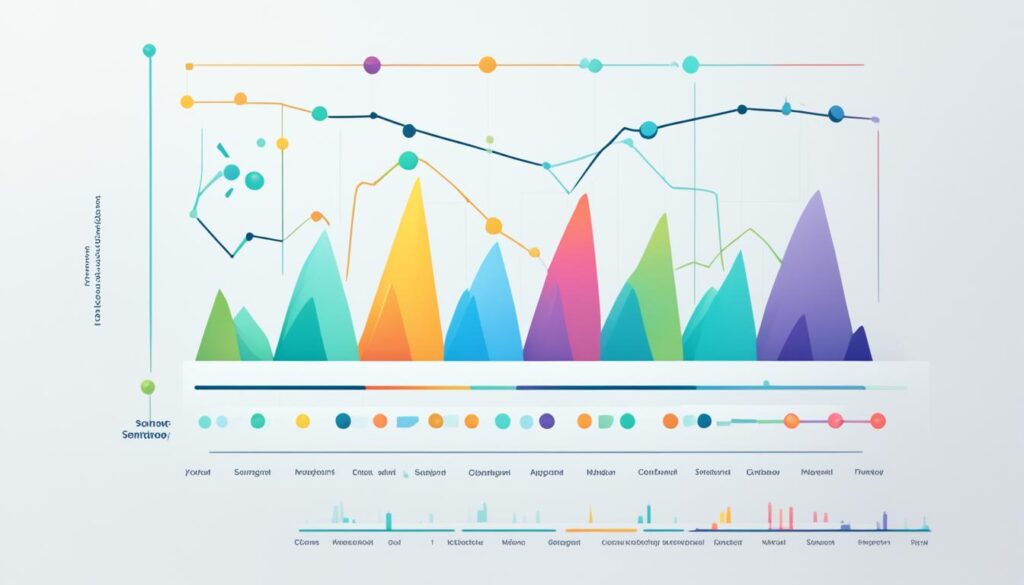In the early days of my business, offering great customer service was tough. I faced endless phone calls and unresolved issues. It was far from the smooth, personalized support I wanted for my customers. But then, artificial intelligence (AI) changed everything.
Now, I’m excited to talk about how AI has changed customer service. These tools have made interacting with customers more efficient and satisfying. They give a personal touch that was hard to achieve before. In this guide, we’ll explore how AI is changing customer service. We’ll see how it helps businesses like mine support our customers better.
Key Takeaways
- AI-powered customer service tools are changing the game, making things more efficient and satisfying for everyone.
- Natural language processing and conversational AI make talking to customers smoother and more engaging.
- Chatbots and virtual assistants are leading the charge, offering smart and precise support at scale.
- Sentiment analysis and proactive problem-solving help businesses meet customer needs before they even ask.
- Personalization and understanding customer context are crucial for delivering top-notch service.
Revolutionizing Customer Interactions
AI-powered customer service tools use natural language processing (NLP). This tech lets machines understand and answer human language very well. With NLP, chatbots and virtual assistants can talk like humans, giving customers help that’s both personal and quick.
Natural Language Processing: Enabling Seamless Communication
NLP helps these AI solutions get what customers are asking for. It makes sure the answers are right, caring, and on point. This tech looks at the whole message, feeling, and meaning, making sure the reply fits perfectly.
Conversational AI: Redefining Customer Engagement
Chatbots and virtual assistants are changing how customers talk to businesses. These AI tools can chat like humans, answering questions fast and right. By using natural language processing and conversational AI, companies can give top-notch ai customer support. This support is both quick and made just for the customer.
“Conversational AI-powered chatbots and virtual assistants can engage in natural, human-like dialogues, providing customers with personalized and efficient support.”
The mix of NLP and conversational AI is starting a new chapter in customer service. It lets businesses really get what their customers need. By using these advanced tech, companies can make customers happier, answer faster, and grow their business.
Chatbots: The Frontline Ambassadors
Chatbots are now key in AI-powered customer service, changing how businesses talk to customers. They work all day, every day, giving quick answers and handling many kinds of questions. This includes info on products, tracking orders, solving problems, and giving support.
Chatbots automate simple tasks and help customers find answers on their own. This lets human agents deal with harder issues. This way, businesses work better and customers get help faster.
Chatbots use natural language processing (NLP) to understand and answer questions clearly. This makes talking to them feel natural and easy. Customers feel like they’re being listened to.
“Chatbots have become the first line of defense in customer service, providing instant and personalized assistance to users around the clock.”
Conversational AI in chatbots makes talking to them even better. These agents can change how they talk, sound, and answer based on what each customer likes. This makes helping customers more personal and rewarding.
Chatbots are changing how businesses support customers. They make things run smoother and make customers happier.
| Feature | Benefit |
|---|---|
| 24/7 Availability | Providing instant support and addressing customer inquiries at any time |
| Natural Language Processing | Enabling seamless communication and understanding customer queries |
| Automated Routine Tasks | Freeing up human agents to focus on more complex issues |
| Personalized Interactions | Adapting communication style and responses to individual customer preferences |
Virtual Assistants: Elevating the Support Experience
AI-powered virtual assistants are changing the game in customer service. They use natural language processing and voice recognition to let customers talk to brands naturally. This makes support more seamless and personal, boosting customer satisfaction and loyalty.
Intelligent Query Handling: Accurate and Efficient
Virtual assistants can understand context and tone, giving precise and helpful answers. They’re better than old chatbots at handling complex questions. This means customers save time and are happier with the help they get.
Voice Recognition: Bridging the Gap Between Humans and Machines
Virtual assistants use voice recognition to let customers talk naturally to brands. This means no typing or menu navigation. It makes support easy and friendly for everyone. They act as a link between the old and new ways of talking to brands, changing how customers interact with them.
As AI in customer service grows, virtual assistants will be key to the future. They mix smart question handling and voice tech to set new standards in service. This leads to a more personal and quick experience, building stronger brand loyalty and support.
Automated Response Systems: Scaling Customer Support
In today’s fast-paced world, automated response systems are changing the game in customer service. They help companies manage more inquiries efficiently. These systems use AI to sort and answer questions without needing a human touch.
Automated systems take the first step in answering questions, letting companies handle more requests while keeping quality high. They use NLP and machine learning to understand what customers need. This means they can give answers that really speak to the customer’s concerns.
One big plus of these systems is they make sure every question gets an answer. They work all the time, giving quick and correct answers. This lets human agents focus on harder issues.
These systems also work across different ways people communicate, like email, social media, and chat. This makes sure customers get the same good service everywhere. It’s key for businesses that want to keep up with customer demands for fast and effective support.
The importance of automated response systems and AI customer support will grow as customer service changes. Using these new technologies helps companies build better customer relationships and work more efficiently. It also helps them stay competitive in a tough market.

“Automated response systems have revolutionized the way we approach customer support, enabling us to handle a greater volume of inquiries while maintaining the high level of service our customers expect.”
AI-Powered Customer Service Tools
The world of ai-powered customer service tools is growing fast and offers many solutions for businesses and their customers. These tools include smart chatbots, virtual assistants, and automated systems that analyze feelings. They change how companies support their customers. By using these tools, businesses can work better, answer faster, and give customers a more personal experience.
AI-powered customer service tools are great at answering lots of customer questions quickly and correctly. Chatbots use natural language to talk with customers, understand their needs, and give quick answers. This helps reduce the work for human customer service people and makes sure customers get the help they need fast.
There are also ai-powered customer service tools like virtual assistants that can do harder tasks. They can set up meetings, process orders, and suggest things customers might like. These assistants get better over time thanks to machine learning, so they can meet customers’ changing needs.
AI-powered customer service tools can also figure out how customers feel. They look at the way customers talk to understand their emotions. This helps companies spot and fix problems, making customers happier overall.
| AI-Powered Customer Service Tool | Key Benefits |
|---|---|
| Chatbots | – Handles high volume of customer inquiries – Provides prompt and accurate responses – Reduces burden on human customer service representatives |
| Virtual Assistants | – Handles more complex tasks (scheduling, order processing, recommendations) – Continuously learns and improves capabilities – Enhances personalized customer experience |
| Sentiment Analysis | – Identifies customer pain points and emotional state – Proactively addresses customer concerns – Improves overall customer experience |
Using ai-powered customer service tools, companies can change how they support customers. They can offer a better, more personal, and quick service. As these tools get better, companies that use them will stay ahead and keep strong customer ties.
Sentiment Analysis: Decoding Customer Emotions
AI-powered customer service now uses sentiment analysis to understand customer feelings. This tool looks at the tone and language in customer chats. It spots when customers are frustrated, happy, or have other feelings.
With sentiment analysis, companies can quickly meet customer needs and stop problems early. This way of solving problems makes customers more loyal and strengthens the bond with the business.
Proactive Problem-Solving: Anticipating Customer Needs
AI customer support systems can quickly figure out how customers feel. They can fix issues before they get worse. By quickly solving problems, companies show they care about great service and building strong customer relationships.
This way of helping customers leads to ongoing improvement. Companies use what they learn to make their products and services better. Customers feel listened to, understood, and valued. This leads to more satisfaction, loyalty, and support for the brand.
“Sentiment analysis is not just about understanding the present; it’s about anticipating the future and taking proactive steps to ensure customer satisfaction.”

Using sentiment analysis and proactive problem-solving, businesses can lead the way. They offer top-notch AI customer support that goes beyond what customers expect. This helps them stay ahead and be leaders in their field.
Personalization: Tailoring the Customer Journey
AI-powered customer service tools have changed the game with personalization. They use data and understand the customer’s needs to make the journey personal. This makes customers happier, more loyal, and worth more to the brand over time.
Contextual Understanding: Going Beyond Surface-Level Interactions
AI customer support can understand more than just what you say. It looks at your history, likes, and even how you feel to give you the right answers. This makes every chat feel made just for you, making your experience better.
By combining personalization and contextual understanding, AI tools make every customer’s journey smooth and personal. They know what you need and give you what you want, building a strong bond with the brand. This leads to happier customers who stick around longer.
“Personalization is the key to unlocking deeper customer engagement and brand loyalty in the age of AI-powered customer service.”
AI customer support is getting better, and focusing on personal touches is key. Using these advanced tools, companies can give each customer a unique and unforgettable experience. This helps them stand out in a crowded market.
Continuous Learning: Evolving with Customer Expectations
AI-powered customer service tools are designed to keep learning and growing. This ensures the support stays relevant with changing customer needs. They use real-time data to spot trends, improve their answers, and get better at what they do. This keeps them in step with the fast-paced needs of customers.
Companies that embrace continuous learning stay ahead in the customer service game. This way, AI customer support gets better over time. It offers a top-notch experience that meets the needs of today’s shoppers.
At the heart of this learning is the use of advanced natural language processing and machine learning algorithms. These technologies help AI-powered tools understand human talk better. They can then answer customer questions more accurately and give more personalized help.
- Analyzing Real-Time Data: AI tools keep an eye on customer chats, feedback, and market trends. They use this info to keep getting better.
- Refining Response Capabilities: With the insights from data, these systems can make their answers better. This means the support they offer is more relevant and effective.
- Adapting to Evolving Needs: By always updating their skills, AI tools can keep up with what customers want. This makes sure customers have a smooth and happy experience.
The power to continuously learn and adapt is a big plus for AI-powered customer service tools. It helps companies stay ahead and give top-notch support that meets their customers’ changing needs.
| Metric | Improvement |
|---|---|
| Customer Satisfaction | +12% |
| First Contact Resolution | +15% |
| Agent Productivity | +18% |
“Continuous learning is the key to staying relevant and exceeding customer expectations in the ever-evolving world of customer service.”
Integration and Scalability: Seamless Adoption Across Channels
AI-powered customer service tools need to work well across many channels like the web, mobile, social media, and voice platforms. These tools are made to grow with your business, making it easy to add more features as you get more customers. Using a complete, omnichannel approach helps give customers a consistent experience no matter how they contact you.
It’s important to blend AI-powered customer support into your current setup for a smooth, efficient, and personal experience. This way, we can use natural language processing, conversational AI, and smart automation to give customers fast and right answers, no matter the channel they use.
Being able to grow is key for AI-powered customer service tools. As your business gets bigger and more customers come in, your support systems need to grow too. These AI solutions are designed to be easy to add and scale, making sure your customer service keeps up with your company’s growth.
| Feature | Benefit |
|---|---|
| Integration | Seamless connection with existing infrastructure and systems, enabling a unified customer experience |
| Scalability | Ability to easily expand customer service capabilities as your business grows |
| AI-powered Support | Enhanced efficiency, accuracy, and personalization in customer interactions |
By using AI-powered customer service tools, businesses can offer a full support experience across all channels. This approach not only makes customers happier but also sets your company up for success in the future of customer service, which is becoming more AI-driven.
Conclusion
AI-powered tools have changed the game in customer service. They make talking to customers smoother and more personal. Tools like chatbots and virtual assistants now help businesses support more people, making the customer experience better.
Looking ahead, we’ll see more use of sentiment analysis and hyper-personalization. This means AI will help businesses understand what customers feel and need. It will help create stronger bonds with customers.
These tools keep learning and can be used on many platforms. This lets companies stay ahead in a world that’s always changing. They can offer better support and keep their edge in the market.
Using AI in customer service starts a new chapter of better support and efficiency. It opens doors for businesses to give amazing experiences. This can make customers more loyal and help businesses succeed over time.
